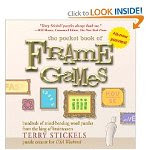
“Visual puns” are readily available on a wide range of websites, and are a great way to get a group’s (or your own) creative juices flowing. As a group exercise, you might download a bunch of samples and either print them out or put them on a screen as part of a Power Point presentation. See if the whole group or partner pairs within the group can guess what they represent, and perhaps give a small prize to those who guess the most correctly – or come up with the most creative interpretations.

A variation on this theme is to show a few examples and then design your own visual illustrations of the phrase with simple drawings or Photoshop manipulations. This can be stimulating as both an individual or group exercise. It can also be stimulating to compare your thinking to others’ ideas. For example, shown here are two versions of a visual pun for “Ipod.”
Think about other words or phrases that might be interpreted in multiple ways: watch dog, quarter horse, eye ball . . .
Here are a few visual pun websites to get you started:
http://www.dvsd.org/dvworld/computergraphics/visual%20puns.html,
http://www.worth1000.com/contest.asp?contest_id=7550 and http://www.visualpuns.net/
http://www.dvsd.org/dvworld/computergraphics/visual%20puns.html,
http://www.worth1000.com/contest.asp?contest_id=7550 and http://www.visualpuns.net/







